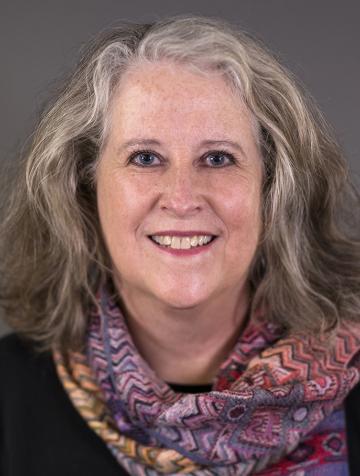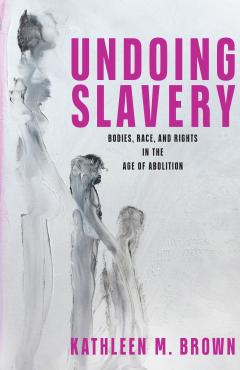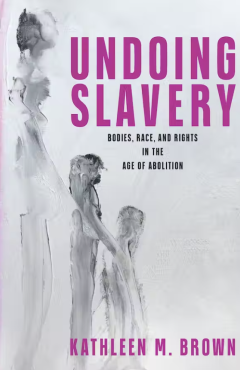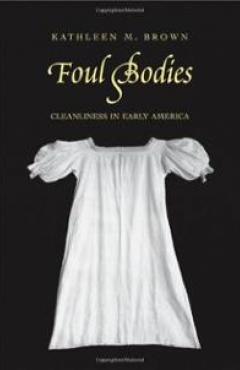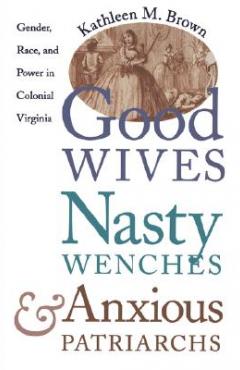Kathleen Brown is a historian of gender and race in early America and the Atlantic World. Educated at Wesleyan University and the University of Wisconsin, Madison, she is author of Good Wives, Nasty Wenches, and Anxious Patriarchs: Gender, Race, and Power in Colonial Virginia (Chapel Hill, 1996), which won the Dunning Prize of the American Historical Association. Her second book, Foul Bodies: Cleanliness in Early America (Yale, 2009), received the Organization of American Historians' Lawrence Levine Book Prize for cultural history and the Society of the History of the Early American Republic Book Prize. Foul Bodies explores the relationships among health, domestic labor, and ideals for beauty, civilization, and spiritual purity during the period between Europe's Atlantic encounters and the American Civil War. Brown is also author of numerous articles and essays. She has been a fellow of the Omohundro Institute for Early American Studies at the College of William and Mary, the American Antiquarian Society, the National Endowment for the Humanities, and the Bunting Institute at Radcliffe College.
She received a Guggenheim Fellowship in 2015-2016 to support her research and writing of her forthcoming book, Undoing Slavery: Abolitionist Body Politics and the Argument over Humanity (University of Pennsylvania Press, 2022). Undoing Slavery is a book-length interdisciplinary study of the transatlantic abolition movement set in the context of contemporary transformations in international and domestic law, medicine, and normative ideals for family and gender. It excavates medical and legal history to understand the abolitionist focus on the body on its own terms. Motivated by their conviction that the human body was universal in its sharing of "one blood," abolitionists in Britain and North America resorted to graphic descriptions of slavery’s violence to galvanize antislavery opinion, organize consumer boycotts, and assist refugees across borders into free territories. Emerging from an Atlantic history of detention, forced transport, and narrow privileges of protected movement, and faced with the growing racism of eighteenth and nineteenth century science, abolitionists focused on undoing slavery’s harm to the bodies of the enslaved. Their pragmatic focus on restoring the bodily integrity and wellbeing of enslaved people threw up many unexpected challenges. Slavery exploited the bodies of men and women differently: enslaved women needed to be acknowledged as mothers rather than as reproducers of slave property, and enslaved men needed to claim full adult personhood without triggering white fears about their access to male privilege. Slavery’s undoing became more fraught by the 1850s, moreover, as federal fugitive slave law and racist medicine converged. The reach of the federal government across the borders of free states and theories about innate racial difference collapsed the distinctions between enslaved and emancipated people of African descent, making militant action necessary. Escaping to so-called “free” jurisdictions, refugees from slavery demonstrated that a person could leave the life of slavery behind. But leaving behind the enslaved body, the fleshy archive of trauma and injury, proved impossible. Bodies damaged by slavery needed urgent physical care as well as access to medical knowledge untainted by racist science. As the campaign to end slavery revealed, formal legal rights, while necessary, were not sufficient either to protect or heal the bodies of African-descended people from the consequences of slavery and racism.
Click here to see Professor Brown talk about Undoing Slavery in a lecture at the University of New England Center for Global Humanities in Portland, Maine on September 25, 2023, entitled "How Abolitionists Put the Body at the Center of the Fight Against Slavery."
Brown offers a wide range of undergraduate and graduate courses on such topics as comparative slavery, colonial America, history of the body, race and sex in early America, and Atlantic history.
Since 2017 she has worked closely with students on the Penn & Slavery project as the project's lead faculty historian.
Ph.D. University of Wisconsin-Madison, 1990
M.A. University of Wisconsin-Madison, 1985
B.A. Wesleyan University, 1981
women and gender; slavery; masculinity; race; history of the body; health and medicine; the Penn and Slavery Project
HIST 11 Deciphering America (with Walter Licht)
HIST 203 Witches, Whores, & Rogues
HIST 345 Sinners, Sex, and Slaves: Gender and Race in America to 1865
HIST 346 Bodies, Race, and Rights: Gender and Race in the U.S. 1865 to the Present
HIST 610 Slavery, Tropical Commodities, and Atlantic Plantation Economies
HIST 670 Comparative History of Slavery and Emancipation
HIST 610 Atlantic History
HIST 670 Comparative Race and Gender
HIST 670 Bodies, Race, and Gender in Comparative Perspective
“Partus Sequitur Ventrem or Nullius Filius?” (co-authored with Jennifer Spear), in progress
“Gender Frontiers of Early America,” Oxford Handbook of American Women’s History, 2018
“The Chesapeake,” The World of Colonial America, ed. Ignacio Gallup-Diaz, 2018
“The Life Cycle: Motherhood during the Enlightenment,” in A Cultural History of Women in the Age of Enlightenment, ed. Ellen Pollak, 2013.
“Strength of the Lion. . .Arms like polished iron: embodying black masculinity in an age of propertied manhood,” in New Men: Manhood in Early America, ed. Thomas Foster (New York University Press, 2011)
“The History of Women in the United States to 1865,” in Bonnie G. Smith, ed., Women’s History in Global Perspective Vol. 2 (University of Illinois Press, 2007)
“Body Work in the Antebellum United States,” in Ann Stoler, ed., Haunted by Empire: Race and Colonial Intimacies in North American History (Duke University Press, 2006)
“In Search of Pocahontas,” in Nancy Rhoden and Ian K. Steele, eds., The Human Tradition in Colonial America (Scholarly Resources, 1999)
“Native Americans and Early Modern Concepts of Race,” in Martin Daunton and Rick Halpern, eds., Empire and Others: British Encounters with Indigenous Peoples, 1600-1850 (University of London Press, 1998)
A Parcell of Murdereing Bitches’: Female Relationships in an Eighteenth-Century Slaveholding Household,” in Karen Robertson and Susan Frye, eds., Women’s Alliances in Early Modern England (Oxford University Press, 1998)
“’Changed. . .into the fashion of man’: the Politics of Sexual Identity in an Anglo-American settlement,” Journal of the History of Sexuality (November 1995)*reprinted in Kathy Peiss, ed., Major Problems in the History of American Sexuality (2001)*reprinted in Catherine Clinton and Michelle Gillespie, eds., The Devil’s Lane: Sex and Race in the Early South (Oxford University Press, 1997)
“The Anglo-Algonquian Gender Frontier,” in Nancy Shoemaker, ed., Negotiators of Change: Historical Perspectives on Native American Women (Routledge, 1995)*reprinted in Thomas Dublin and Katherine Sklar, eds., Women and Power in American History (2002 edition)
Penn GSWS and the Center for Research in Feminist, Queer, and Transgender Studies Africana Studies
History and Sociology of Science

